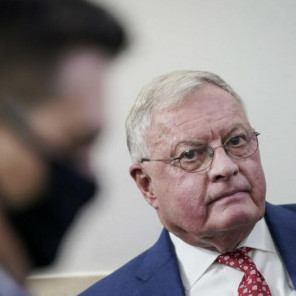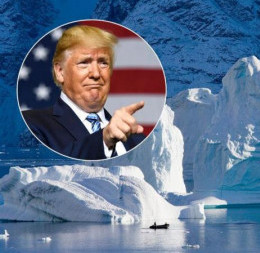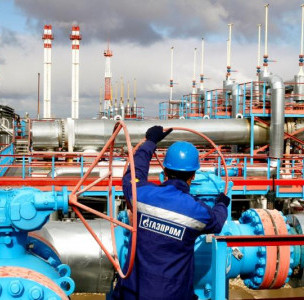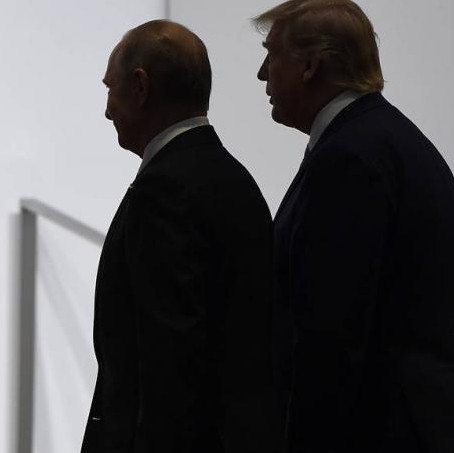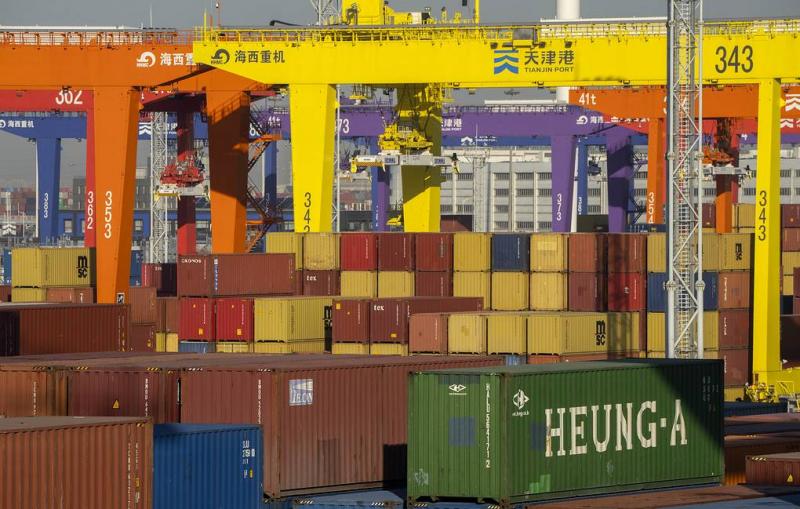
- Press review: Russia, US move past Biden’s legacy as Kiev assures NATO of fight readiness
- Press review: US and China launch trade war while Russia and the US hold new talks
- Press review: Trump’s trade war may spark recession as Europe backs 'Russia conflict' idea
- Press review: US sees first protests since Trump’s return and OSCE seeks Russia’s comeback
Tehran, Moscow, and Beijing plan to hold expert-level consultations in Moscow on Iran’s nuclear program amid escalating US tensions; the US and China are on the brink of a full-scale trade war amid "Black Monday" market meltdown driven by Trump’s tariff campaign; and the SCO and BRICS are considering closer market integration. These stories topped Tuesday’s newspaper headlines across Russia, according to TASS news agency.
Vedomosti: Iran, Russia, China to hold consultations amid US ultimatum
Trilateral talks between representatives of Iran, Russia, and China on the Iranian nuclear program will take place at the expert level in Moscow on April 8, according to Russian Foreign Ministry spokeswoman Maria Zakharova. The announcement came a day after Iranian Foreign Minister Abbas Araghchi rejected as meaningless US President Donald Trump’s proposal for direct negotiations on reviving the nuclear deal. At the same time, Araghchi emphasized that Tehran remains committed to a peaceful resolution of the crisis but prefers talks to be conducted through intermediaries - currently, Oman is playing that role, Vedomosti writes.
During the trilateral consultations in the Russian capital, Iranian representatives are likely to seek military and economic support from Russia and China in exchange for Tehran’s abandonment of its nuclear program, according to Kirill Semenov, expert at the Russian International Affairs Council.
Tehran refuses to engage in direct negotiations with Washington due to the volatility of the current US administration, junior research fellow at the Center for Middle East, Caucasus, and Central Asia Studies at the Higher School of Economics Ilya Vaskin told Vedomosti. Iranians remember that it was during Trump’s first term in 2018 that the US withdrew from the nuclear agreement and then imposed severe anti-Iranian sanctions.
Several days earlier, a source cited by the Tehran Times reported that Iran’s missile forces were being prepared to strike US targets in the Middle East in the event of a military threat. Meanwhile, a source within the Iranian government confirmed to Reuters that Iran’s Supreme Leader Ali Khamenei had placed the country’s armed forces on high alert. However, the following day, Reuters, citing Iraqi military and government officials, reported that several powerful Iran-aligned militant groups in Iraq were prepared to disarm following Trump’s threat to take action against them.
Semenov considers the report about the disarmament of Iraqi groups to be an information maneuver aimed at de-escalating US-Iran tensions. He added that the move is essentially meaningless, as these forces formally no longer exist as independent entities and are now part of Iraq’s official security apparatus.
Vedomosti: US, China set to intensify trade conflict
If China does not reverse its decision to impose retaliatory duties of 34% on the United States, the US will respond with additional levies of 50% starting April 9, US President Donald Trump wrote on the social media platform Truth Social. Taken literally, Trump’s statement suggests that the total trade penalty on Chinese goods would exceed 100% - reaching 104%. For now, Beijing is also publicly signaling that it has no intention of entering talks with the US president under such pressure. Experts told Vedomosti they believe that Trump’s tariff threats are a strategic gambit aimed at pressuring China into talks, but escalating the trade war could trigger economic fallout.
A reduction in trade due to tariffs will result in significant GDP losses for countries involved in global commerce, potentially leading to a recession, according to Anastasia Vlasova, a macroeconomic analyst at Ingosstrakh Investments. She emphasized that the negative impact of the tariffs will be substantial for both the US and China. However, Beijing is not raising interest rates - instead, it is cutting them in an effort to stimulate sluggish domestic consumer demand. At the same time, the likelihood of rate hikes in the US is mounting.
Trump’s aggressive rhetoric is a tactical strategy aimed at bringing China back to the negotiating table on trade and other issues, chief research fellow at the Institute for US and Canadian Studies Vladimir Vasilyev told Vedomosti. According to the expert, Trump’s insistence on the need to reduce the trade deficit with China is nothing more than a feint. "Reducing the deficit is technically possible, but given the structure of US-China trade relations, it is an economically risky move that could result in disruptions - primarily for the US economy. Trump understands this," Vasilyev added.
China is not prepared to enter negotiations with the US in the format Trump is proposing, head of the Center for Asia-Pacific Studies at the Russian Academy of Sciences’ Institute of World Economy and International Relations Alexander Lomanov stressed. During Trump’s first term, China was caught off guard by the abrupt imposition of punitive tariffs. Now, the situation has fundamentally changed: throughout President Joe Biden’s administration, China has been preparing for a new round of trade conflict. According to Lomanov, the unprecedented sanctions pressure on Russia served as an additional catalyst for Beijing.
Izvestia: SCO explores market alignment with BRICS amid global trade upheaval
The markets of the Shanghai Cooperation Organization (SCO) and BRICS could potentially be integrated, representatives of the SCO Secretariat told Izvestia. They clarified that such a decision would need to be made by the competent authorities of the member states of both blocs. However, experts noted that a rapid merger is unlikely, due in part to the overlapping memberships of these countries in other international organizations. In the long term, a joint trade space could help the participating nations cope with the consequences of the United States’ aggressive tariff policies and accelerate the process of de-dollarization.
"In the future, the alignment of SCO and BRICS markets cannot be ruled out, but this is a matter for the competent authorities of the respective countries. At present, the SCO is not considering the issue of common tariffs or other economic preferences for the member states of both organizations. But again, the decision rests with our governments," the SCO Secretariat told Izvestia.
BRICS currently includes Brazil, Russia, India, China, South Africa, the United Arab Emirates, Iran, Ethiopia, Egypt, and Indonesia as full members. Merging these markets would create significant opportunities for expanding trade between these nations. Nonetheless, there are substantial obstacles to such coordination. Many BRICS and SCO members also participate in other international bodies, complicating market harmonization, Izvestia writes.
The economic agendas of SCO and BRICS are united at least by their shared commitment to reducing reliance on the dollar. According to the newspaper, this would make countries within both organizations less dependent on the Group of Seven (G7) nations - especially the United States, which is seen as using the dollar as a political weapon.
Amid the United States’ aggressive tariff strategy toward many countries, enhanced economic cooperation within BRICS and the potential expansion of its market through SCO states could help soften the impact of Washington’s trade restrictions, independent expert Andrey Barkhota told Izvestia.
"The key beneficiary of removing internal trade barriers within BRICS and the SCO would be China. The potential for increased trade turnover in this scenario does not exceed 20%. Still, with the global turmoil stirred by Donald Trump’s actions, BRICS may indeed gain renewed momentum for development. However, the absence of the EU and the US from these groupings means that BRICS and the SCO cannot replace the World Trade Organization," Barkhota added.
The first step toward cooperation between BRICS and the SCO could involve developing a shared roadmap, as well as exchanging information and experience in areas such as environmental policy, according to Victoria Panova, Vice Rector at the Higher School of Economics and Head of the BRICS Expert Council.
Nezavisimaya Gazeta: Kiev sets boundaries before negotiations on resource pact with US
A Ukrainian delegation will travel to Washington this week to define its red lines regarding a proposed agreement on mineral resources, First Deputy Prime Minister and Minister of Economy of Ukraine Yulia Svyrydenko announced. According to her, the previous draft of the agreement merely reflected "the position of the legal team at the US Treasury Department." Meanwhile, US Treasury Secretary Scott Bessent had earlier stated that Washington was "fully prepared" to sign the draft. However, the Ukrainian government is intentionally postponing the finalization of the agreement. Experts told Nezavisimaya Gazeta the proposed US-Ukraine resource agreement may be deliberately delayed by Kiev in hopes that Trump will scrap it and shift responsibility for Ukraine to Europe.
Svyrydenko emphasized that Ukraine intends to "establish its red lines and the core principles on which the agreement should be based," so that upon completion of the negotiations, the final version of the document would fully align with Ukraine’s strategic national interests.
Reports have already surfaced that the draft prepared by the US administration has generated a wave of criticism in Kiev, as it grants the United States preferential access to revenue generated from Ukrainian natural resources. Moreover, the agreement would, in effect, place the management of Ukraine’s mineral deposits and any new infrastructure projects under American control.
Former Ukrainian Verkhovna Rada deputy Vladimir Oleynik told Nezavisimaya Gazeta that Vladimir Zelensky may have deliberately sparked a scandal in the Oval Office to derail the signing of the resource agreement. According to Oleynik, Zelensky may have already approved the transfer of control over Ukraine’s resources to the United Kingdom in a secret protocol to a century-long bilateral cooperation agreement signed with UK Prime Minister Keir Starmer in mid-January.
"In reality, both documents would appear to be legally questionable, since Article 13 of Ukraine’s Constitution stipulates that land, subsoil, airspace, and water are the property of the Ukrainian people. Transferring these resources requires the consent of the rightful owner - via a national referendum," Oleynik stressed.
In light of this, Oleynik believes Zelensky’s team is deliberately buying time - waiting until Donald Trump withdraws from the controversial agreement and, by extension, Ukraine itself, shifting the burden of responsibility onto Europe.
Izvestia: Global markets tumble on ‘Black Monday’ as trade tensions escalate
It may take at least three months for global stock markets to stabilize - and that is under an optimistic scenario, in which US President Donald Trump swiftly formulates a solution to the economic conflict he has triggered, reaches agreements with trade partners, and at least partially reverses the tariffs, Izvestia writes. Should the situation continue to deteriorate, the downturn in market indices could extend for a year or longer. Equities across Asia, Europe, and the United States have fallen for the third consecutive session, with the decline intensifying on April 7. Experts believe the day deserves to be labeled "Black Monday", while the week following the introduction of tariffs can rightfully be called "grim".
The MSCI Asia-Pacific Index, which tracks the capitalization of markets in the region, fell by 6.8% on Monday, marking its worst performance since 2011. Taiwan’s TSEC Capitalization Weighted Stock Index plummeted nearly 10%, while Japan’s Nikkei slid by 8%. In Europe, Germany’s DAX lost 10% in a single day, and the Stoxx Europe 600, which reflects the share prices of the region’s 600 largest companies, fell by 5.8%.
"The sell-off in Europe has continued unabated since Thursday - the night Trump announced tariffs against the world’s largest economies. Cumulative losses over the last few sessions have already reached around 15%. This is the fastest decline since the first pandemic lockdowns in 2020, making it a five-year record," Kirill Seleznev, stock market expert at Garda Capital, told Izvestia.
The market collapse, particularly in Asia and Europe, can indeed be described as a "Black Monday," Ivan Potekhin of BCS World of Investments told the newspaper.
"Market prospects now rest entirely on Trump’s decisions and how he chooses to handle the crisis he sparked. I suspect he’ll backpedal under pressure from his own party members. They’re all investors, holding large portfolios, and are terrified by what’s unfolding," Seleznev added.
He expects that within the next few months, a deal may take shape - one that Washington will present as a landmark trade victory for the United States. Both China and other countries would be inclined to support such an agreement.
According to Seleznev’s forecast, if this scenario materializes, markets could feasibly return to their prior levels within the next year. During Trump’s first term in 2018, a similar recovery took roughly three months - although the scale of the trade war at the time was significantly smaller.
TASS is not responsible for the material quoted in these press reviews
